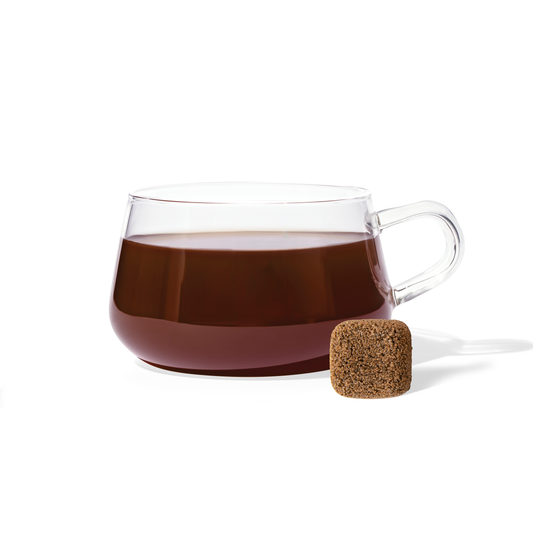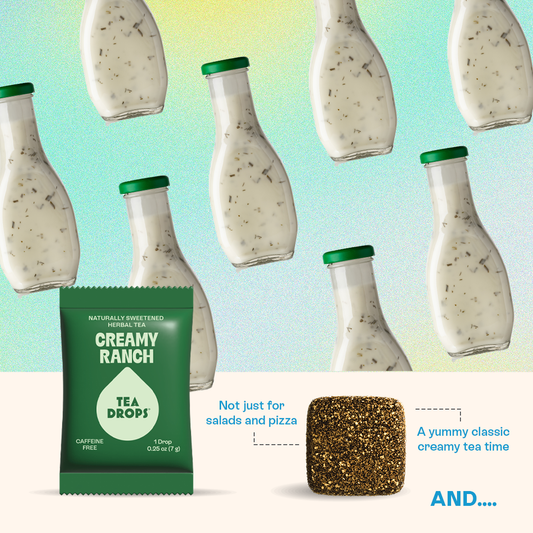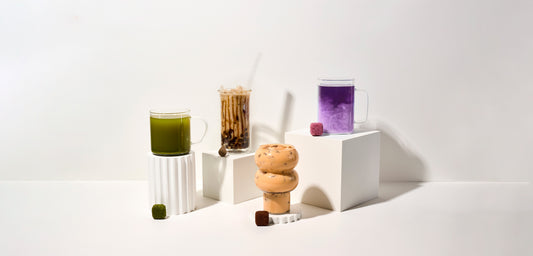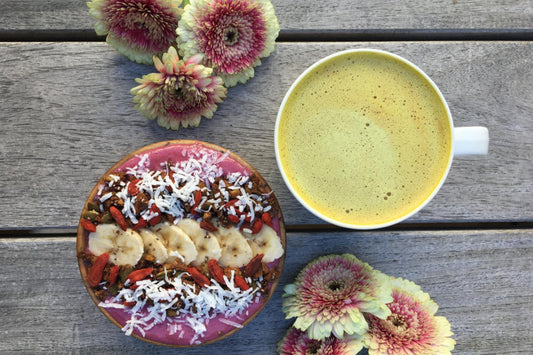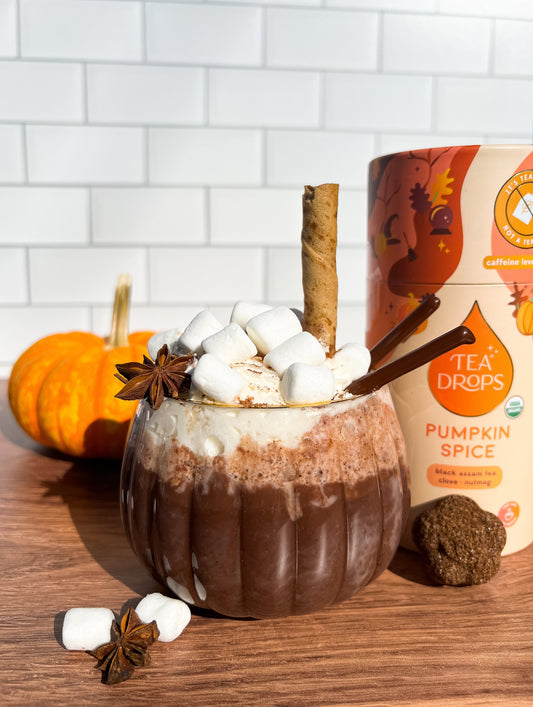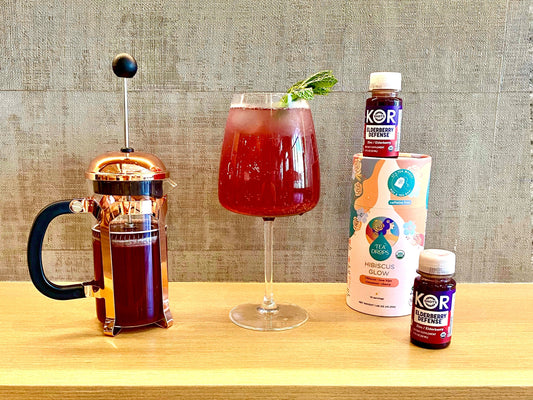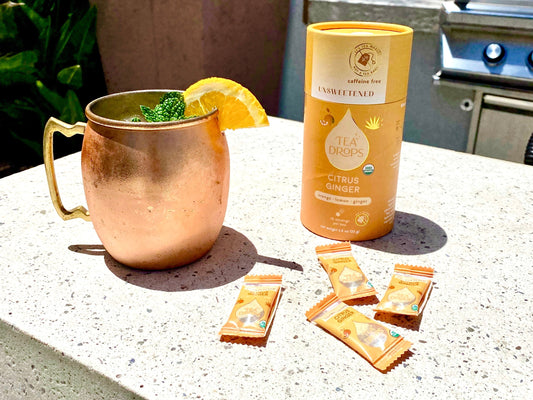
Do you ever wish you had an instant remedy for beating the bloat? It could be sitting right up on your kitchen shelf.
It may be a drink as old as time but one of the original jobs of the humble cup of tea was to provide a digestive aid to those with stomach complaints and other gastro issues. Tea already has a reputation for being soft and soothing, and these traits work on the body as well as the mind. Across many cultures for centuries, tea is poured as an after-dinner treat or as part of the daily routine to encourage good gut health.
The digestive system plays a major role in our overall well-being. A good gut can positively impact everything from our immune system to mental health. Whether from stress, modern living, diet, or natural constitution, stomach issues can be a common and even a chronic ailment for many. Whether it’s indigestion, constipation, bloating, nausea, acid reflux, or IBS, getting your gut in good working order is essential for boosting your health and finding pleasure in life’s little delicacies once more. Here, we take a look at exactly how tea can help your system and delve deep to discover the best tea for digestion. Pop the kettle on to brew and let’s get busy!
What Causes Your Digestive System to Slow?
There are many reasons why your digestive system could start to be sluggish and slow. It could be something as simple as a diet change, a lifestyle shake-up, or being diagnosed with a digestive disorder or diabetes. The modern world moves at a fast pace, rest can be scarce, and food can be quick and convenient. This can wreak havoc on our digestive system and lead to discomfort when it comes to digestion.
Digestion tends to be a 24-hour process after eating food. It’s a six-step process that involves your saliva breaking down the food in your mouth, and the esophagus relaxing to let the food enter your stomach. Then, the digestive enzymes in your stomach get to work breaking food down even further. Your small intestine gets involved with enzymes from your liver, gallbladder, and pancreas. What’s left after all the good stuff has been taken then moves to your large intestine where the waste and water are separated. The waste is then pushed toward your lower colon.
As you can see it’s a well-oiled clever machine but like all machines, gears can go wrong if we don’t help keep the system in good working order.
Tea can help in a number of ways. First, it keeps your body hydrated which is essential for keeping you regular. Second, tea is brimming with antioxidants, polyphenols, and certain compounds which can soothe, heal, and help your digestive enzymes to get into the swing of things. Certain kinds of herbal tea is often considered to be a brilliant booster when it comes to digestive health.

What is Herbal Tea?
Herbal teas are sometimes called tisanes and refer to a drink made from herbs, spices, or plant matter steeped in hot water. These kinds of tea differ from the tea that comes from the camellia sinensis plant such as black tea. Herbal teas are often caffeine-free and are believed to have numerous health benefits unique to the herb or plant that the tisane is blended from.
History of Herbal Tea
The practice of sipping tea to soothe digestion is not a new-fangled idea, it has been around for centuries. One of the most common cultures to turn to tea regularly is China where the popular and slightly fermented Pu-erh tea is often consumed after meals to help the body get in the mood and to encourage an easy flow of chew and finish. In Morocco sipping mint tea after a meal is also an integral part of the food and family home culture. Tea as a digestive aid is a tried and tested remedy throughout the ages and around the world.
What Are the Signs of Digestion Problems?
Here are some common symptoms of a sluggish digestive system:
· Bloating
· Nausea or vomiting
· Belching
· Heartburn or acid reflux
· A near-constant feeling of fullness
· Stomach pain or spasms
· Decreased appetite
· Constipation or diarrhea
Should You Skip The Caffeine?
While caffeine can be awesome for that morning boost, coffee and other highly caffeinated drinks don’t always do your digestive system a service. Caffeine can stimulate the muscles within your colon which encourages bowel movements. It can also encourage diarrhea, heartburn (thanks to its stimulative effect on the nervous system), a leaky gut, and dehydration which in turn can lead to constipation. If you truly want to nurture your digestive system in a healthy way, herbal tea is the best solution.

Best Teas for Digestion
When it comes to the digestive system, not all teas are born equal. Certain herbal teas almost seem to be designed for a happy and harmonious tum as they get to work soothing, healing, and styling your gut to be in gorgeous health. Take a look as we map out the very best teas to turn to whenever you feel like you need a stomach fix.
Green Tea
The master healer tea, green tea is loaded with goodness and considered to be a superfood for good reason. Along with its bounty of other health benefits, green tea is also a dab hand when it comes to ironing out digestive issues. As green tea is loaded with catechins like EGCG it can help reduce inflammation, ease stomach cramps, and can even help in matters relating to metabolism and weight loss.
Ginger Tea
Joyful ginger has just the right amount of spice to shake your senses to life and a whole heap of digestive healing properties too. Ginger tea is believed to ignite your digestive fire in ayurvedic healing and it stimulates your digestive enzymes so your body can break food down swiftly. There have been a bunch of studies into the digestive benefits of ginger and it’s also a known remedy for keeping nausea and sickness at bay.
Licorice Tea
You either love or loathe the anise-like taste of licorice but whatever your preference it does make for a magically soothing tea. While licorice root may be better known for helping heal a cough, it also works to prevent ulcers in the stomach. Licorice increases the production of a compound that helps line and protects the stomach from too much acid. It’s also rich in flavonoids that help to fend off bacteria that can cause ulcers. Licorice was the go-to remedy of the Ancient Greeks when it came to easing digestive dilemmas.
Lemon Tea
Light and zesty and full of summer fragrance, lemon is another sweet sipping tea that keeps you hydrated and helps prevent constipation. There’s a reason everyone loves lemon water in the morning but by heating it up you have a clean and refreshing brew that keeps you regular, boosts your vitamin C intake, and gets you moving. In ayurvedic medicine lemon’s sour element is said to stir up your ‘Agni’ which can help to prevent a buildup of toxins and encourages healthy digestion.
Fennel Tea
One of the oldest natural remedies for digestion, fennel seeds have been around for centuries. The ancient Egyptians adored peppery fennel for its medicinal qualities and to this very day, brewing up fennel tea helps to relax muscles in the digestive tract to ease symptoms of bloating, cramping, and other conditions which make you feel like your stomach is all tied up in knots. Fennel also helps your body in its bile production which breaks down food faster and keeps your system in tip-top shape. For those wrestling with flatulence issues, a warming cup of fennel tea can calm your system right down.
Chamomile Tea
A sweet and gentle soothing tea, chamomile may be synonymous with a good nights sleep but this tea also packs quite a punch when it comes to sending digestive issues packing. As it relaxes the senses, chamomile can reduce pain symptoms and ease inflammation and other stomach lining stress factors that could cause cramps and diarrhea. The good work doesn’t stop there, chamomile also pushes down the production of pepsin which is linked to acid reflux.
Peppermint Tea
Forever fresh and soothing, peppermint tea offers one of the best sip-worthy experiences for your stomach. This lovely light tea comes from the mentha piperita plant and has a cooling taste and cooling touch to match. Peppermint oil has been found to help ease symptoms of IBS. It also works on your pain receptors and reduces inflammation, helping to truly put that stomachache behind you. It also assists with cutting down on gastric acid in the stomach which is why it is such an awesome brew for your after-dinner drink.

Frequently Asked Questions About Herbal Tea
We take a quick peek at some of the most common questions around herbal tea and digestion to help give you the lowdown on what you need to know before you brew.
What tea helps digest food?
All the above herbal teas help you to get your digestion system up and running. Specifically for digesting food with ease, you can turn to peppermint, ginger, and green tea too.
Does tea irritate the stomach?
Tannins that tend to be found in the ‘true’ teas can irritate the stomach as they can be astringent to those with a certain sensitivity. For those looking for a tea to heal digestive issues, you are best sticking to herbal teas which can be much softer on the stomach.
What drinks soothe the stomach?
Herbal teas like ginger, peppermint, and chamomile all help to soothe a sore or upset stomach. Ginger ale can also help to soothe a stomachache and club soda can neutralize stomach acid and encourage gas pressure relief.
How can I cleanse my stomach and intestines naturally?
From drinking lots of water to upping your herbal tea intake and sipping juices and smoothies, these are all ways to keep your digestive system flushed and in the fullest of health. A high-fiber diet and saltwater flush can also help.
Wrap Up
Healthy digestive systems are essential to keep us feeling fit, active, and in control of our life. It’s never fun to feel like food is the enemy or to experience discomfort throughout the day. Whether you are fighting through chronic digestive issues or just looking to keep yourself flushed and in full health, these herbal teas are just the ticket.
**Medical Disclaimer: The information in this article is for informative purposes only and shouldn’t be taken as medical advice. Those who have any health-related queries should be sure to reach out to a medical professional. These statements have not been evaluated by the Food and Drug Administration. This article is not intended to diagnose, treat, cure, or prevent any disease.
Products You Might Like
We think you will love these products!
